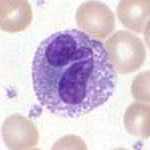Scientists at Wake Forest University Baptist Medical Center are about to begin a trial to determine whether a new cancer treatment will be as effective at eradicating cancer in humans as it has proven to be in mice.
The treatment will involve transfusing specific white blood cells, called granulocytes into patients with advanced forms of cancer. A similar treatment using white blood cells from cancer-resistant mice has previously been highly successful, curing 100 percent of lab mice afflicted with advanced malignancies. Granulocyte - image via WikipediaThe study is being announced on June 28 at the Understanding Aging conference in Los Angeles. It will involve treating cancer patients with white blood cells from healthy young people whose immune systems produce cells with high levels of cancer-fighting activity.
Granulocyte - image via WikipediaThe study is being announced on June 28 at the Understanding Aging conference in Los Angeles. It will involve treating cancer patients with white blood cells from healthy young people whose immune systems produce cells with high levels of cancer-fighting activity.
The basis of the study was the discovery of a cancer-resistant mouse and their subsequent finding that white blood cells from that mouse and its offspring cured advanced cancers in ordinary laboratory mice. They have since identified similar cancer-killing activity in the white blood cells of some healthy humans.
Human cancer-fighting cells from healthy donors have been tested against human cervical, prostate and breast cancer cells in the laboratory, with good results. The scientists say the anti-tumor response primarily involves granulocytes of the innate immune system, a system known for fighting off infections.
Granulocytes are the most abundant type of white blood cells and can account for as much as 60 percent of total circulating white blood cells in healthy humans. Donors can give granulocytes specifically without losing other components of blood through a process called apheresis that separates granulocytes and returns other blood components back to donors.
In a small study of human volunteers, it was found that cancer-killing activity in the granulocytes was highest in people under age 50. This activity can be lowered by factors such as winter or emotional stress. They said the key to the success for the new therapy is to transfuse sufficient granulocytes from healthy donors while their cancer-killing activities are at their peak level.
For the upcoming study, 500 local potential donors who are 50 years old or younger and in good health are being recruited to have their blood tested. Of those, 100 volunteers with high cancer-killing activity will be asked to donate white blood cells for the study. Cell recipients will include 22 cancer patients who have solid tumours that either didn't respond originally, or no longer respond, to conventional therapies.
The goal of the phase II study is to determine whether patients can tolerate a sufficient amount of transfused granulocytes for the treatment. Participants will be monitored on a regular basis, and after three months scientists will evaluate whether the treatment results in clear clinical benefits for the patients. If this phase of the study is successful, the study will be expanded to determine if the treatment is best suited to certain types of cancer.
1 year ago



1 comment:
This is so exciting! And sounds like something entirely different from the T cell therapy for melanoma which was in the newspapers a week or so ago!
Post a Comment